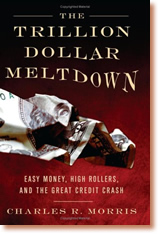Book Review: The Big Short
Wednesday, April 14th, 2010
Lewis, Michael. The big short : inside the doomsday machine. W. W. Norton, 2010.
Master storyteller Malcolm Gladwell calls Michael Lewis the finest storyteller of our generation. Moneyball and Liar’s Poker made him one of the best business journalists today. Among his recent successes is The Blind Side.
The Big Short is called the definitive book on the current recession. Having worked at Saloman Brothers in the 1980s, he provides an insider’s view of a perfect storm brewing. Lewis’ story revolves around several obscure Wall Street players who understood the housing market was built on a house of cards.
Although most people are left with the impact of the recession; Steve Eisman, an analyst at Oppenheimer and Co.; Greg Lippman a bond trader for Deutsche Bank; and Michael Burry, who left Stanford Medical School to manage his own hedge fund, acted upon an opportunity to make tremendous profits. (more…)


